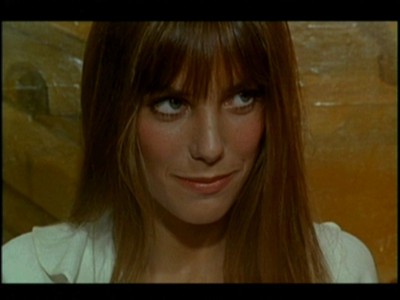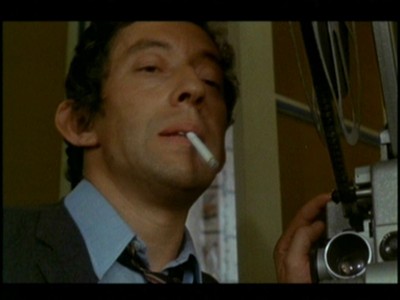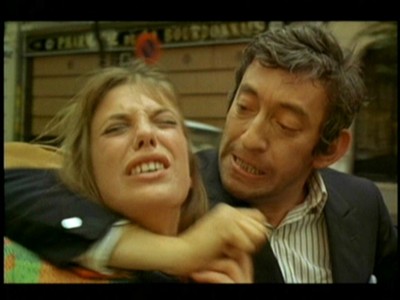| Reviews & Columns |
|
Reviews DVD TV on DVD Blu-ray 4K UHD International DVDs In Theaters Reviews by Studio Video Games Features Collector Series DVDs Easter Egg Database Interviews DVD Talk Radio Feature Articles Columns Anime Talk DVD Savant Horror DVDs The M.O.D. Squad Art House HD Talk Silent DVD
|
DVD Talk Forum |
|
|
| Resources |
|
DVD Price Search Customer Service #'s RCE Info Links |
|
Columns
|
|
|
Slogan
Cult Epics has released Slogan, the 1969 Pierre Grimblat "cult" film starring legendary French musician/singer/actor/director Serge Gainsbourg and English model/actress Jane Birkin. Now, when I see the word "cult" stamped on a DVD box under an older title, I'm always a little intrigued, wondering if the film truly is a "cult" item or if the moniker's inclusion is just a bit of hyperbolic marketing, calculated to sell discs. Quite frankly, I had never heard of Slogan before, but Gainsbourg and Birkin were somewhat familiar names to me from the late 60s and early 70s, so maybe I was in for a treat here with Slogan, coming in totally cold on a title and finding something fun or unique (which can be one of the most satisfying movie-watching experiences, when it comes off right).

Serge Faberge (Serge Gainsbourg) is a much sought-after television commercial director working in Paris. Married to his cool, lovely, pregnant wife Francoise (Andrea Parisy), middle-aged Serge (he's 40, but he tells people he's younger) becomes involved in a torrid affair with Evelyne (Jane Birkin), an 18-year-old English girl he spots quite by accident in Venice, where he's attending a film festival for TV commercials. Evelyne, naive and open to Serge's sophistication - as well as irritated, but receptive, to his frequent standoffishness and outright abuse - enjoys her limited time with Serge, but increasingly, she questions his commitment to her, specifically in reference to whether or not he's going to divorce Francoise.
Despite this pressure, Serge bypasses Evelyne's steady boyfriend (who's oddly passive about the whole matter), even when Evelyne momentarily leaves Serge to marry him (she bails at the last minute). Reunited with his young lover, Serge finally leaves his wife (who's had their child and who warns him he's making a mistake) and moves in permanently with Evelyne - although he hasn't actually divorced his wife. But trouble for the new couple arrives in the form of stuntman Dado (Gilles Millinaire), a young, handsome daredevil with a speedboat who catches Evelyne's eye during a trip with Serge to Venice.
SPOILERS ALERT!
It's hard to actively dislike Slogan, even though there's not much going on in this slight, obvious French soufflé - and what is going on smacks of obvious late 60s clichés, like romantic montages that remind you of those feminine deodorant ads they used to have on TV, or stream-of-consciousness, fractured time frames, suffused with arty jump cuts. All of that is fine, actually, if you're feeling nostalgic for that period of foreign filmmaking, but too much of Slogan seems awfully familiar going to be much of a "cult" film.
Admittedly, I had to do a bit of research into who exactly Serge Gainsbourg was (I think the description of him that stood out the most was his label as "the French Bob Dylan"), and for that matter, Jane Birkin (whom I only remember seeing from Blow-Up, and that was because she was nude). I had heard their names before, always mentioned together because they were something of a celebrity couple back during this time (I would think they were far more popular over in Europe than here in the States, where I would imagine not too many people know their names). Curiously embodying the tumultuous times they inhabited with their "beauty and the beast" pairing (he the grizzled, rumpled French intellectual and iconoclast musician, and her the stunningly beautiful, English rose "mod" model), the pair evidently fell in love while making Slogan, and became part of the "beautiful people" set during their 11-year marriage. The highlight of their fame was apparently a recording they made together, Je T'Aime...Moi Non Plus, which was banned all over Europe for its suggestiveness (according to what I read, Birkin simulated an orgasm on the song - years before Donna Summer, apparently).

Watching Gainsbourg and Birkin fall in love on the screen, it's hard to discern much genuine chemistry between the two of them (proving once again that old Hollywood adage that lovers in real life seldom translate that spark onto the screen). Birkin, lovely perfection in repose, is rather hopeless once she opens her mouth (is she dubbed here? At times it seems so), and she doesn't seem to know what to do with her hands or her body (her "cabinet dance" to show her excitement at moving in with Serge is laughably bad). True, she's playing a petulant, naive young thing whose idea of romance is pulling faces and mooning around and letting her boyfriend rough her up; when she complains that Serge doesn't give enough of himself to her, in stereotypical French film tough-guy shorthand, he smacks her around. It's not exactly a layered part, and novice Birkin shouldn't be expected to do much with it. But as far as Birkin projecting any kind of unique sex appeal or erotic intrigue or compelling intelligence, that's not on display here in Slogan.
As for Gainsbourg, maybe something is lost in the translation, but it's tough to see what caused all the hubbub (if indeed he did cause a hubbub with moviegoers). Not conventionally handsome (which never was an impediment to being a movie star, to be fair), that lack of surface allure isn't matched by any kind of intriguing maleness. Often acting like a bargain-basement Jean-Paul Belmondo, complete with a studied Gallic indifference (there's always a cigarette dangling from his lips while his hooded eyes squint through the smoke) and a faux-tough guy stance, Gainsbourg comes off as singularly unattractive - both physically and emotionally - to the point where one wonders why Birkin would fall in love with him, either in front of or behind the camera. Obviously she did, but the "why" or "how" of it isn't conveyed to us.
Again, the lack of audience connection with these two actors may indeed stem from the routine nature of the film itself (I haven't seen either one of them in anything else; they may be terrific in other projects). Slogan's satire on the advertising world is at first amusing (the opening commercial spoof - certainly the funniest moment in the film - is terrifically paced and quite amusing), with Serge's commercials satires definitely the bright spots in the film. But director Grimblat's attempts to link them in an ironic, meaningful fashion with Serge's life is pretty heavy-handed, and ultimately uninteresting because we simply don't care about the womanizing Serge. Women today might find Slogan a bit much to take, with Serge's physical and emotional manhandling of Evelyne seen in a relatively positive light, particularly when she keeps coming back to him after he pushes her around. For example, to punish Evelyne after he leaves his wife for her - perhaps then blaming her for his loss of independence? - Serge introduces Evelyne to his friends at a party as his "little home wrecker." And wait till you see the scene were Serge and Evelyne's step-father, played by Daniel Gelin, bond like good Frenchmen over joshing/serious talk about the best way to slap Evelyne around to keep her in line.
And director Grimblat can't seem to pass up an opportunity to give us endless montages of the lovers hanging out and doing all the silly stuff that lovers do when they're starring in a movie that needs to pad out its running time with "genuine" and "quirky" and "touching" moments (my favorite almost-camp moment is when director Grimblat rapidly whip-pans back and forth between the two lovers, as if we're watching a tennis match). Clearly, people on the set were clued in to what was happening between the stars off camera, but the decision to include those moments of romance jar with the rather weak, prosaic main plot of a middle-aged man, afraid of impending age and horrified at the thought of finally being settled with a wife and child, playing around with a gorgeous 18-year-old kid, and they certainly detract from (and devalue) the anemic little stabs at 1969's consumer culture Grimblat tries throw out (the height of insight in director Grimblat's screenplay is to have the TV playing in the background in every scene with Serge and Evelyne). The film's obvious aping of similar, better films (Blow-Up is certainly referenced, particularly in several sequences with Serge where he appears to be channeling David Hemmings' photographer moves) only points out, ultimately, how derivative the whole exercise becomes after awhile, and all we're really left with is, is checking out the cool clothes, and the Parisian and Italian location work (the Venice boat ride is admittedly exciting), and Birkin's hypnotic face.

The DVD:
The Video:
The non-anamorphic, 1.66:1 letterboxed video transfer for Slogan has several problems (besides the flat presentation), including grain, faded colors, a general softness to the image, and what looks to be PAL conversion issues, noticeable particularly when the camera pans quickly in a scene.
The Audio:
One of the few big pluses in Slogan is the terrific soundtrack by Serge Gainsbourg. His music is incredibly evocative of that era and of this kind of film, and in this big, fat French two-channel mono mix, it's loud enough, but not particularly distinguished (the love theme sung by Gainsbourg and Birkin still sounds great, though). English subtitles are available.
The Extras:
The only extra included is the original theatrical trailer.
Final Thoughts:
It may indeed be a "cult" film to those European audiences who are invested in the real-life love story of Serge Gainsbourg and Jane Birkin, who met and fell in love during the making of Slogan, but for the uninitiated, Slogan comes off as a watchable, familiar, but certainly not memorable examination of a love affair between a cultured, bored, cynical, uncommitted, unattractive middle-aged man and an innocent, trusting, unbelievably gorgeous young kid. You see? With that description, you could write the rest of movie yourself, couldn't you? Nostalgia for this type of film from that time period will be enough for that crowd (myself included) to rent Slogan, but the general audience won't be interested.
Paul Mavis is an internationally published film and television historian, a member of the Online Film Critics Society, and the author of The Espionage Filmography.


|
| Popular Reviews |
| Sponsored Links |
|
|
| Sponsored Links |
|
|
| Release List | Reviews | Shop | Newsletter | Forum | DVD Giveaways | Blu-Ray | Advertise |
|
Copyright 2024 DVDTalk.com All Rights Reserved. Legal Info, Privacy Policy, Terms of Use,
Manage Preferences,
Your Privacy Choices | |||||||












